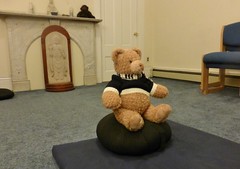In this time of social distancing and self-isolation, there is a meme going around that suggests introverts have been waiting their whole life for this moment. This might be true, but so is this: Buddhists of all stripes–introverted and extroverted alike–are similarly well-prepared for these extraordinary times, as hunkering down is something Buddhists do religiously.
When I contemplate the next few weeks (or more) of social isolation–the staying home, the sheltering in place–what comes to mind is a Zen retreat. Going on a retreat turns the simple choice of staying inside into an intentional spiritual practice. Right now, countless people who don’t consider themselves Buddhists are waking up to the realization that the Universe has signed them up for a long Zen retreat without asking first.
How do you turn self-isolation into a retreat? You make a schedule and stick to it. You intentionally alternate sitting and walking. You pay attention to mental hygiene, which is as important to your sanity as hand-washing is to your physical health. You cultivate gratitude and embrace boredom. And in the end, you recognize your intrinsic, unavoidable connection with all sentient beings in this contagious and contaminated world.
Yesterday on a video conference call with some other professors, a colleague remarked that he was diligently recording brief video lectures so that when or if he gets sick, his online course will carry on without him. While others are hoarding toilet paper and cans of soup, this colleague is preparing for the inevitability of his own mortality.
A split second after my colleague made this remark, a thought appeared: how will I continue teaching if I grow deathly ill and die…or worse yet, how will I continue teaching if any of my students were to sicken then disappear? This is a thought I’ve never contemplated: in all my years of teaching, the hyperbolic language of “surviving the semester” and even simply “passing the class” were innocuous and mundane. It’s not like my class or any other is a matter of life and death.
But then again, isn’t everything in our daily lives a matter of life and death? My earlier assumption that there would inevitably be a “next semester”–an “after” that follows this “before”–now seems terribly glib, presumptuous, and naive. Who was I just last week that I took so much for granted?
The thing about Zen retreats is this: absolutely nothing happens. You stay inside and spend hours staring at the floor. Every day, you eat the same boring breakfast–always oatmeal–at the same boring time; every day you show up and follow the same boring schedule whether you feel like it or not. You do this because when you sign up for a Zen retreat, you choose to put yourself in a situation where you have no choice.
None of us chose to live in these interesting times: we all are trapped in a situation that none of us willingly signed up for. But if self-isolation follows the model of a Zen retreat, here is what will happen, eventually: a couple days, weeks, or months into this crazy exile, something unforeseen and even magical will happen. Eventually, if you stop fighting against inevitabilities, you will see nothing more than what is actually there. You will taste the same bowl of oatmeal for the very first time, and you will notice anew that this morning’s angle of sunlight on the floor is somehow just like yesterday’s while being entirely unique.
None of us signed up for this: we were thrust into a dying world the moment we were born. But now that we are stuck here, isolated in our separate homes but united in our shared mortality, what will we do with this fragile moment?




















